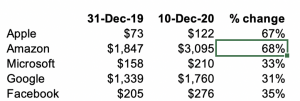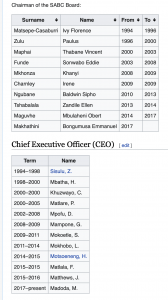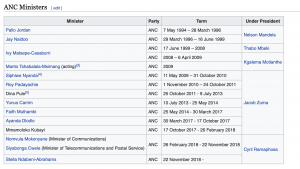Airbnb Inc. listed on the Nasdaq stock exchange on 10 December 2020. I thought it strange that any business associated with travel and accommodation would list amidst the blowout from the COVID-19 pandemic and the associated lockdowns. But Airbnb and its advisers are a brave bunch and forged ahead regardless. I must admit to having a bit of a ‘hit and miss’ experience with bookings we have made using Airbnb. Of the four places we have rented in Cape Town over the past 3 years, one has been a winner and three not so much. I recall the spot in Sea Point we rented that was up three flights of stairs and so small that we were literally bumping into each other in the cupboard sized apartment. The spot we rented in Gardens was an absolute shocker. I hardly slept during our two night stay as the noise from the street was astonishingly loud. A walk around the neighborhood revealed that a risqué club was a couple of blocks down the street and an all night retail store across the street that seemed to attract dubious characters. We rented a lovely spot in Camps Bay but unfortunately the plot next door was a construction site that was rather noisy. We finally stumbled another place in Camps Bay that is as absolute gem. I guess that is the risk of renting accommodation from private property owners which are not accredited by some travel association. I love the idea of Airbnb though and will continue to make use of its platform to find value for money accommodation.
 I had some spare time this week so I downloaded the Airbnb prospectus and had a long read – the document was over 489 pages! Here are some interesting facts about Airbnb:
I had some spare time this week so I downloaded the Airbnb prospectus and had a long read – the document was over 489 pages! Here are some interesting facts about Airbnb:
- Airbnb was founded in 2007 by Brian Chesky and Joe Gebbia, two twenty six year olds. These dudes are worth circa US$11 billion and US$10 billion after yesterday’s listing. Not too shabby!
- Before COVID-19, 54 million active bookers reserved 327 million nights accommodation using the Airbnb platform in 2019
- Airbnb has over 4 million hosts in more than 220 countries and in ±100,000 cities and towns
- The value of gross bookings on the Airbnb platform in 2019 was around US$38 billion
- Sequoia Capital, a Californian based venture capital fund headed by Roelof Botha (Pik Botha’s grandson), was the anchor investor in Airbnb prior to the listing
- Airbnb has not made a profit in any financial year of its 13 year history (cumulative ±US$2 billion losses)
I often value businesses in the course of my professional career. Sometimes these are in friendly circumstances and often not (think shareholder disputes, think merger & acquisition transactions, think court cases). Anyway, I built a basic Excel model (refer attached) Airbnb valuation (Dec 2020) in attempting to value Airbnb. For those of you who are into valuations and financial numbers, this could be an interesting read. For the rest of you, perhaps have a quick peek and move on. Just a warning re the numbers, Airbnb’s year-end is December so the 2020 numbers are an educated guess on my part. I will update the valuation model in March next year when Airbnb releases its final results. Valuations are based on forecasts and hence a guarantee of error – it is more important to minimize the error than to pretend to be Nostradamus.
The investment bankers valued Airbnb at US$68 a share for the purposes of the initial public offering (IPO) – implied value of US$47.5 billion of the business according to my calculations. I follow Professor Aswath Damodaran’s blog and gleefully noted his recent blog on Airbnb. Damodaran is a professor at the Stern School of Business at New York University and a highly regarded valuation academic. Damodaran attached his Excel spreadsheet to the blog post and this revealed a valuation of US$54 per share or US$36.5 billion in total for the group. This valuation was right on the money in terms of the speculation about the IPO pricing until earlier this week when the investment bankers advised an listing price of US$68 per share. Well they were way off – the Airbnb share price closed at US$144.71 on 10 December 2020 valuing the business at ±US$100 billion. How about that sports lovers?
If you had a peek at my valuation model you will have noticed that I derived a valuation range of between US$28 and US$37 per share. I am inherently conservative when it comes to valuations but US$144 a share is in a different galaxy. My model assumed that the gross value of bookings (GBV) on the Airbnb platform would reach US$80 billion by 2030 and revenue may reach US$10.5 billion. Damodaran estimated GBV of US$156 billion, revenue of circa US$22 billion and profit after tax of US$4 billion by 2030. I think those projections are a tad optimistic but it’s in my nature to be skeptical.
I am concerned that US stock markets are over-heating. Apple’s market capitalization (value) has increased by around US1 trillion in 2020. We now have four companies listed on US stock markets which are worth more than a trillion dollars each. Refer below for what has happened to the share prices of some of the tech stocks in 2020 so far.

I understand the hype around increasing online shopping but Amazon’s core business is loss making (AWS makes good money but the rest not so). What has changed with regards to Apple’s business model and products/services over the past 11 months that justifies a 67% increase in its share price? Facebook is facing an existential threat from US authorities who are recommending that it sell off Instagram and WhatsApp.
When companies share prices start disconnecting with economic reality, I fear for the widows and pensioners. I have seen this type of exuberance before in stock markets. I hope I am wrong but I have a foreboding of a lot of pain and suffering coming from over priced financial assets.
All the best from BeechieB.

 You may recall Dr Ngubane’s (chairperson from 2010 to 2013) antics at the SABC and subsequently as Eskom chairperson. Ms Suzanne Vos made some damning statements about Dr Nbubane to the Parliamentary Monitoring Group in March 2013 following the mass resignations from the SABC board. She stated that Dr Ngubane was prone to making unilateral decisions without consulting the rest of the board of directors. He attempted to overturn board decisions such as the relieving Hlaudi of his position as acting COO. Dr Ngubane apparently also failed to attend meetings if he was angry or did not get his own way. That type of behavior clearly works as he was then entrusted to chair Eskom through difficult times. He was spectacularly unsuccessful at that and we are all living with the consequences of irregular power and another debt laden SOE (refer an earlier blog about Eskom and its inability to trade out of its debt burden).
You may recall Dr Ngubane’s (chairperson from 2010 to 2013) antics at the SABC and subsequently as Eskom chairperson. Ms Suzanne Vos made some damning statements about Dr Nbubane to the Parliamentary Monitoring Group in March 2013 following the mass resignations from the SABC board. She stated that Dr Ngubane was prone to making unilateral decisions without consulting the rest of the board of directors. He attempted to overturn board decisions such as the relieving Hlaudi of his position as acting COO. Dr Ngubane apparently also failed to attend meetings if he was angry or did not get his own way. That type of behavior clearly works as he was then entrusted to chair Eskom through difficult times. He was spectacularly unsuccessful at that and we are all living with the consequences of irregular power and another debt laden SOE (refer an earlier blog about Eskom and its inability to trade out of its debt burden). The ANC seemed to take the Department of Communications seriously at the start of its rule by appointing heavyweights such as Pallo Jordan to oversee matters. Unfortunately, some of the appointees over the past 10 years had questionable reputations. Dina Pule was apparently adept at lying and cheating to benefit her then boyfriend back in the days. Faith Muthambi has been implicated in state capture given evidence at the Zondo Commission. She must have done some naughty stuff for OUTA to have laid treason and corruption charges against her in 2017. Mention Nomvula Mokonyane and I think Bosasa and Xmas braai packs. Stella Ndabeni-Abrahams was caught flagrantly disregarding lockdowns regulations earlier in 2020. She is now in the news for overturning the SABC board of directors decision to retrench 400 employees. Perhaps Stella needs to do a Corporate Governance 101 refresher.
The ANC seemed to take the Department of Communications seriously at the start of its rule by appointing heavyweights such as Pallo Jordan to oversee matters. Unfortunately, some of the appointees over the past 10 years had questionable reputations. Dina Pule was apparently adept at lying and cheating to benefit her then boyfriend back in the days. Faith Muthambi has been implicated in state capture given evidence at the Zondo Commission. She must have done some naughty stuff for OUTA to have laid treason and corruption charges against her in 2017. Mention Nomvula Mokonyane and I think Bosasa and Xmas braai packs. Stella Ndabeni-Abrahams was caught flagrantly disregarding lockdowns regulations earlier in 2020. She is now in the news for overturning the SABC board of directors decision to retrench 400 employees. Perhaps Stella needs to do a Corporate Governance 101 refresher.
Recent Comments